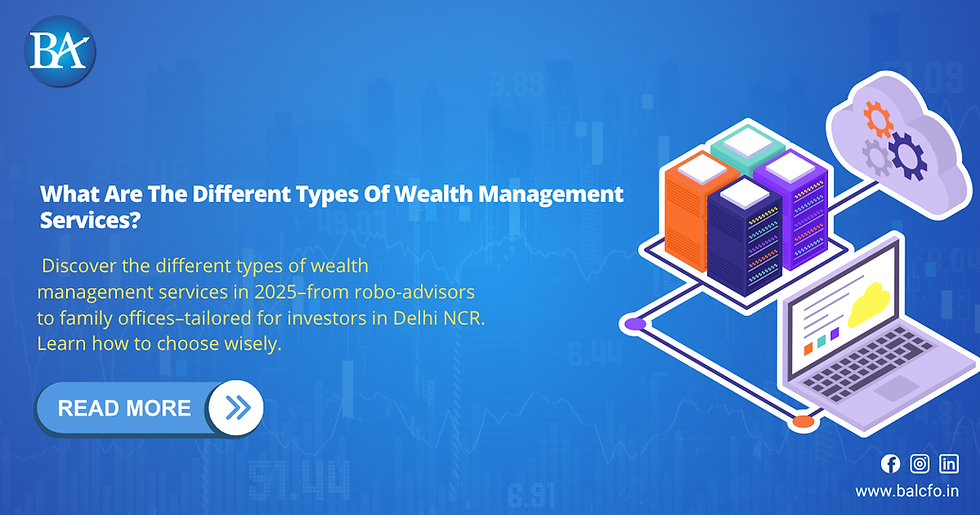What Are The Different Types Of Wealth Management Services?
- Bell Wether
- Aug 1, 2025
- 4 min read

Wealth management services have evolved into a comprehensive ecosystem. Whether you're building wealth or preserving legacy, understanding the types of wealth management services today helps you make informed choices—especially when exploring a Wealth management company in Delhi NCR or meeting a Wealth manager in delhi NCR.
1. Financial Planning & Advisory
At the heart of wealth management services lies personalized financial advisory. This includes cash-flow planning, retirement strategies, tax planning, estate planning, and intergenerational wealth transfer. In 2025, demand leans heavily on goal-based advisory and AI‑powered insights that adapt to evolving life stages.
2. Investment Management
This involves managing portfolios tailored to your risk appetite, time horizon, and financial goals—ranging from mutual funds, PMS (Portfolio Management Services), to AIFs (Alternative Investment Funds) or even ETFs. For High‑Net‑Worth Individuals (HNWIs), features such as direct indexing or tax-efficient ETF strategies are now becoming standard.
3. Robo‑Advisory & Digital Platforms
Robo‑advisors offer algorithm-driven investment management with minimal fees and accessible minimums. In India, robo models now pair with human oversight to deliver hybrid advice. These are part of modern wealth management services offerings, especially appealing to younger or digitally native investors.
4. Alternative & Private Assets
2025 has seen explosive interest in private credit, real estate, private equity, family‑office style assets, and even niche assets like marinas or whiskey barrels. These options supplement traditional holdings and offer portfolio diversification. In India, specialized investment funds (SIFs) bridge mutual funds and AIFs for mid‑affluent investors.
5. Family Office & Estate Planning
For ultra‑wealthy families, wealth management services now include concierge-level solutions via single‑ or multi‑family offices. They coordinate investments, succession planning, philanthropy, and legacy purpose. Dynasty trusts and family office coordination are critical tools in estate planning and preserving multi-generational wealth.
6. ESG & Thematic Advisory
Aligning investments with values—such as sustainability, impact, or thematic goals—is a growing priority. Wealth management services now include ESG tracking, impact measurement, and reporting to ensure alignment with client beliefs and regulatory standards.
7. Tax, Estate and Retirement Integration
Wealth management services also integrate broader planning—tax optimization, estate instruments, health insurance, retirement decumulation strategy, and philanthropy. In 2025, these operate under unified models that see your full net-worth picture for smarter decisions.
How to Choose the Right Wealth Management Service
A. Understand Your Profile
Ask yourself: Are you a mid‑affluent investor, an HNI, or looking for family-office services? Your choices—from robo-advisors to bespoke family offices—must align with your complexity, horizon, and values.
B. Clarify Objectives
Do you want growth-focused investing? Income generation? ESG alignment? Or legacy structuring? Knowing your goal helps match with specialized wealth management services—such as alternative investment advisory or thematic ESG investing.
C. Evaluate Advisor & Technology Mix
Hybrid models combining human advisors with AI‑powered platforms now deliver hyper‑personalized advisory and seamless digital onboarding. Look for firms that use intelligent tools for tailored insights, quick onboarding, and unified portfolio reporting
D. Check Regulatory Robustness & Transparency
In India, regulatory clarity around SIFs, AIFs, PMS, and tax‑efficient investments is evolving. A trusted Wealth management company in Delhi NCR should provide clear fee structures, compliance documentation, and transparency around illiquid or alternative assets.
E. Local Expertise Matters
Working with a Wealth manager in delhi NCR brings tangible benefit—understanding local taxes, demographics, and Indian regulatory nuance. Local advisors help navigate GST, capital gains taxation, and succession laws effectively.
Q: What are the main types of wealth management services?
A: They include:
Financial planning & advisory
Investment management
Digital robo-advisory
Alternative/private asset advisory (PMS, AIFs, SIFs)
Family-office & estate planning
ESG/thematic investing
Integrated tax, retirement & estate planning
Each caters to different investor needs, from simple digital solutions to bespoke legacy strategies.
Ready to Transform Your Wealth Journey?
Choosing the right wealth management services is critical to building and preserving your financial goals—especially when partnering with a trusted Wealth management company in Delhi NCR or Wealth manager in delhi NCR who combines local expertise, cutting-edge technology, and a holistic advisory approach.
At BellWether, we offer tailored financial planning, integrated investment management, access to alternative assets, ESG advisory, retirement and estate strategy, and seamless digital experience. Our experts in Delhi NCR blend global best practices with local know‑how—ensuring your wealth strategy is both sophisticated and grounded.
FAQs
1. What’s the minimum investment for various wealth management services in India?
Minimums vary: robo‑advisors often start at ₹50,000–₹1 lakh. PMS/AIFs typically require ₹50 lakh+, and SIFs start at around ₹10 lakh. Family‑office clients are usually UHNI, with higher thresholds.
2. How does a robo‑advisor differ from a full‑service wealth manager?
Robo‑advisors are digital-first, algorithm-based platforms for investment management, automated advice, lower fees, and quick onboarding. Full-service wealth managers combine bespoke human guidance across tax, estate, retirement, and complex investment planning.
3. Why consider alternative investments or private assets?
They help diversify beyond public equities and bonds, offer potential for higher returns, and may be less correlated to market volatility. However, they’re usually less liquid, pricier, and suited for informed or high-net-worth investors.
4. Is ESG or impact investing part of wealth management services today?
Yes. Modern wealth management includes ESG and thematic advisory where portfolios reflect environmental, social, or governance priorities. Reporting and traceability are increasingly regulated and requested. Clients can now map investments to personal values or global themes.
5. When is a family office needed instead of a standard wealth manager?
If your needs include multi-generational succession, complex estate structuring, philanthropy, bespoke investments, and concierge-level service, a family office is beneficial. Standard wealth management typically supports a single individual or family with investment and planning services.




Comments